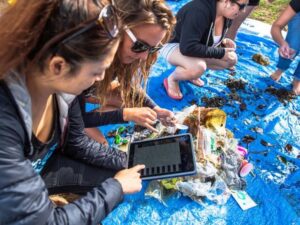Applying knowledge to identify solutions to end plastic waste
Australia’s plastic litter baseline project, and innovative science and technology for stormwater drains and gross pollutant traps to prevent litter ending up in the ocean. Download a PDF copy of the presentations given at the Symposium here:
- A Pacific Ocean Litter Project View on plastics challenges in the Pacific Islands region and the key role of knowledge to inform decision making – Andreas Volentras (Secretariat of the Pacific Regional Environment Programme)
[no abstract available]
- Measuring and monitoring waste leakage to identify and support appropriate interventions and solutions in Australia and beyond – Denise Hardesty (CSIRO)
This speed talk will highlight some of the work being undertaken in Australia and the region to establish consistent data collection efforts, build capacity, and to apply information to socially, culturally, economically and environmentally appropriate place-based solutions. The talk will touch on a national data portal CSIRO and stakeholders around the country are collaborating on and baseline monitoring efforts in Australia and elsewhere. I will also highlight risk analysis work being undertaken to estimate the risk of ingestion and entanglement on key marine taxa and the role of legislation and social factors in reducing plastic losses to the environment.
- Protecting our oceans from (and with) plastic waste – Brad Dalrymple (Ocean Protect)
Approximately 80% of plastic pollution in our ocean comes from land-based sources, with the vast majority flowing through drains to our waterways and oceans via stormwater runoff. Urban stormwater runoff often also contains harmful levels of other less visible (but extremely damaging) pollutants and is recognised as the key source of pollution in our urban waterways. The impact of stormwater runoff within Australia is due to a combination of factors, including high pollution generation rates in urban areas, the vast majority of urban areas having no stormwater treatment assets, and (where stormwater treatment assets are integrated) these assets receive minimal (and often zero) maintenance (e.g. to remove accumulated material).
This presentation will also feature the official launch of the new ‘OceanGuard’ a technology – a gully pit insert/ basket that can be installed within new and existing stormwater pits to capture pollution, and which is now made with 90% waste plastic.
- New Technologies for Ending Plastic Waste – Gross pollutant trap sensor project – Justine Barrett (CSIRO)
The main pathway for litter getting into Australia’s waterways and oceans is by being carried along with rainfall through stormwater systems. Gross pollutant traps (GPTs), aka underground rubbish bins, are installed to capture litter before it reaches natural waterways. However, GPTs are often left full, deeming them ineffective. Reasons for this generally link to cost and the basic out-of-sight, out-of-mind principle. To help overcome this, CSIRO is developing GPT smart sensing devices that monitor the fullness of each trap and alert management when they need to be emptied. Additionally, CSIRO is developing an artificial intelligence method for detecting litter items in waterways with image-recognition machine learning (ML) models. By deploying these two emerging technologies, we can then estimate the amount of litter being lost to the ocean via our waterways. This will help highlight litter hotspots and ultimately reduce litter lost to Australia’s waterways and surrounding oceans.

